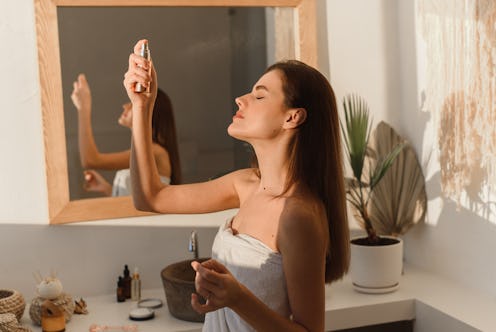
Hypochlorous acid has popped up in a lot of skin care products lately. And while it’s not a brand new ingredient, it has people buzzing for all the right reasons.
A disinfectant that eliminates bacteria and viruses, hypochlorous acid (HCOI) is produced naturally by the body. “[It] is a naturally occurring molecule made by the immune cells of our own bodies and has been found to be much more powerful than bleach in sanitizing water, and effective against not only bacteria but also biofilms, fungus, and even viruses,” says Dr. Arianne Shadi Kourosh, M.D., board-certified dermatologist at Sadick Dermatology and assistant professor at Harvard Medical School.
Dr. Lynn McKinley-Grant, M.D — board-certified dermatologist and Namesake Skincare advisor — explains that hypochlorous acid is made for skin care purposes when water, salt, and vinegar are electrically charged by a process called electrolysis that harnesses disinfecting properties safe enough to use on skin. “It is used as a surface cleaner but is gentle and effective enough to be used by surgeons in wounds and ophthalmologists to treat infections in the eyes,” she adds. “Dermatologists use hypochlorous acid to prevent skin infections.”
According to Kourosh, it has been found in multiple studies to be safe for most skin types. People can still develop allergies or irritation with products that are otherwise safe, however, so she recommends testing it on an area other than your face (such as your arm) to see if you have any sort of negative reaction. If you’re in the clear and want to incorporate hypochlorous acid into your skin care routine, read one for more of the derms’ pro tips.
The Benefits Of Hypochlorous Acid
McKinley-Grant lists preventing and treating infections as the main benefits of using hypochlorous acid. “It is FDA approved for inflammation and infection around the eyes, she says. “[It is] also used in sprays and lotions for eczema and atopic dermatitis triggered by a staphylococcal infection.” She adds that it is used by surgeons to clean wounds during surgery, and studies show that hypochlorous acid’s anti-bacterial and anti-inflammation properties help fight breakouts and soothe and repair damaged skin.
How To Use Hypochlorous Acid In Your Skin Care Routine
While the anti-bacterial ingredient can be included in cleansers, serums, and creams, the biggest trend is to use it in over-the-counter sprays. McKinley-Grant recommends spraying it after cleansing, and then continuing on with the rest of your routine. She says some dermatologists also recommend using it while wearing a mask to prevent acne.
Afterward, lock everything in with a moisturizer. She recommends a product like the Namesake Skincare Daily Moisturizer, which contains nourishing ingredients like rosehip oil and butterfly bush to improve skin’s overall tone and texture.
If this piqued your interest, below are some products that contain the multi-tasking skin care ingredient.
We at Bustle only include products that have been independently selected by our editors. We may receive a portion of sales if you purchase a product through a link in this article.
Experts:
Dr. Lynn McKinley-Grant, M.D., board-certified dermatologist and Namesake Skincare advisor
Dr. Arianne Shadi Kourosh, M.D., board-certified dermatologist at Sadick Dermatology and assistant professor at Harvard Medical School
Studies referenced:
Del Rosso, J., & Bhatia, N. (2018). Status Report on Topical Hypochlorous Acid: Clinical Relevance of Specific Formulations, Potential Modes of Action, and Study Outcomes. J Clin Aesthet Dermatol. 2018 Nov; 11(11): 36–39. https://www.ncbi.nlm.nih.gov/pmc/articles/PMC6303114/